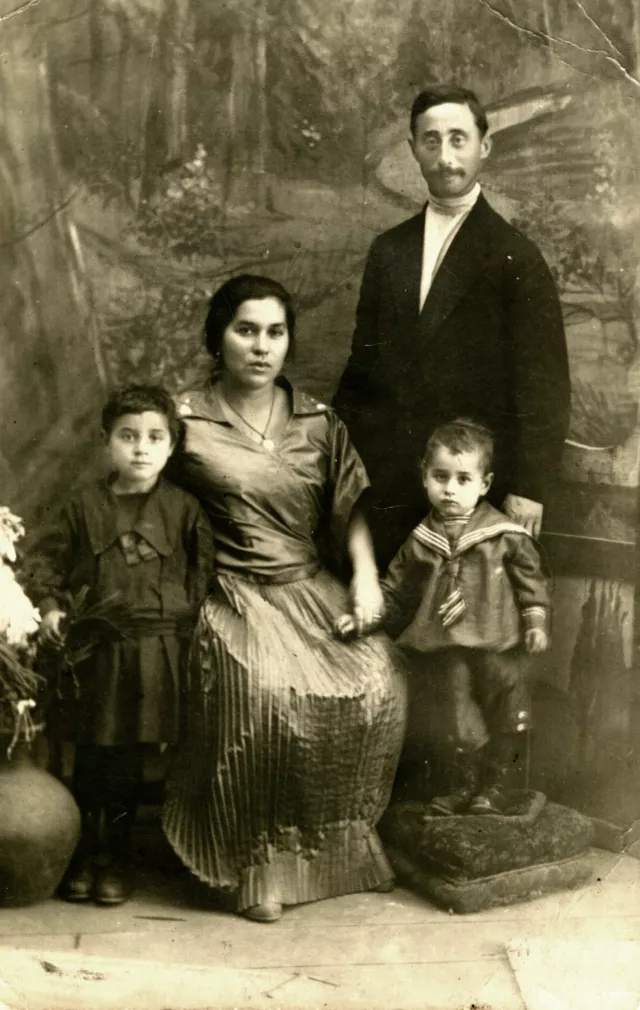Zhenia Kriss with her parents Haim Kriss and Sima Kodrianskaya and her brother Froim Kriss
My parents, Sima Kodrianskaya and Haim Kriss, my brother Froim and I photographed on Froim's birthday in Kiev in 1924.
My father, Haim Kriss, was born in Sidelkovo in 1893. I don't know what kind of education he got. I believe, he only had classes with his tutors at home, but he was a pretty educated and intelligent man. He worked as a clerk at his father's wood storage. He had to know the basics of this business to do his work well. My parents met in the store when my mother came to buy some wood.
They got married in 1919. It was at the height of the Civil War, and they only had a small wedding with their closest relatives. But it was a traditional Jewish wedding with a chuppah at the synagogue in Schekavitskaya Street. This was one of the biggest synagogues in Kiev, a beautiful two-storied brick building. Although my parents weren't religious they had no alternative. They had to obey their families' wish and accept all religious rituals to be performed at their wedding, according to the rules that have been observed over centuries.
My parents rented a tiny apartment, with one small room and a kitchen, in Podol. I was born in this apartment on 23rd February 1920. I was named Charna at birth, but I didn't know my real name until the middle of the 1980s when I obtained a copy of my birth certificate. My parents called me Zhenia, and I was sure that my real name was Evgenia [Zhenia is affectionate for Evgenia]. In 1922 my brother, Froim, was born.
When the NEP was over, my father was also declared a nepman, like my grandfather, and deprived of his electoral right - just like my grandfather. It was terrible that nobody wanted to employ him. He had to work as a loader or cart man for the rest of his life, even though he was an educated and intelligent man. It was hard physical work and he needed to be strong.
My father grew up in a religious family and observed Jewish traditions. I remember him sitting by the stove in our apartment, putting small pieces of pork fat on sticks and frying them over the fire. He kept saying, 'If there is a God, he is smart and understands that I have to eat pork fat to be strong, and that I need to be strong to keep my job, because if I loose it my kids will die'. This was his only breach of Jewish rules. He had a tallit and tefillin that he put on to recite a prayer. He prayed in a corner of the room every morning. We celebrated Pesach, Chanukkah, Purim and Rosh Hashanah in our family. My father didn't fast onYom Kippur, though. It would have been too hard for him.
We lived a very poor life. My father worked until late carrying heavy loads. When he came home he was very tired and went to sleep. My mother sewed at home. I assisted her doing minor tasks. My mother had a hard life, but she was a very nice and kind person, she sympathized with other people and always tried to help them. She also supported Hava, Shloime's wife. She made clothes for her children and often sent me to take little treats to them. My mother had no education, but people liked her for her kindness. My mother was a good singer. We lived in the basement of the house and there were often people near our windows listening to my mother singing while she was doing her work. She sang Jewish and Ukrainian songs and Russian ballads. Once a stranger came in, charmed with her singing. He told her that she had a wonderful voice and could enter a conservatory and that he would help her to do it. My mother declined telling him that she had to support her husband and raise their children.












